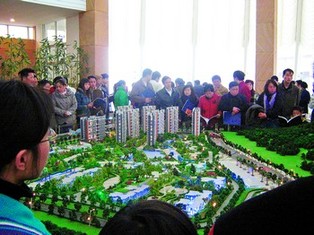The General Office of the State Council, or Cabinet, on Sunday unveiled more details of a real-estate stimulus package adopted at an executive meeting of the Council last Wednesday.
The document, called A Number of Opinions Concerning Boosting Healthy Development of the Property Market, was posted on the central government's official website. It emphasized low-income housing and home ownership.
The five-point opinions included building more houses for low-income urban families, encouraging home buying, supporting property developers to deal with changing market, enhancing role of local governments in stabilizing the real estate market, and improving surveillance on the property market.
 |
|
Property prices in 70 major Chinese cities rose 0.2 percent in Nov. from a year earlier, the lowest growth rate since 2005. |
The document repeated last Wednesday's decision that the government will solve the housing problem for 7.47 million low-income urban families and 2.4 million households in shantytowns in the next three years. Rural homes in dangerous condition will also be renovated.
It detailed the goal for 2009, during which the government will help overcome housing difficulties for 2.6 million low-income urban families and 800,000 households in shantytowns.
It also repeated all other major points adopted by last Wednesday's executive meeting of the Council.
According to the package, someone who has owned his home for two or more years can now sell it without having to pay business taxes. Previously, owners had to wait at least five years before selling houses tax-free.
If they sell their houses within two years, owners only have to pay taxes levied on the profit, not the sales price.
To boost home buying, the government also allows people with "smaller-than-average" apartments to buy a second apartment under favorable loan terms. Size limits are different in every city.
This is the latest in government efforts to prop up the real estate sector. Previous measures include pledges to build more low-income housing and cuts of mortgage rates and down payments for first home buyers.
Property prices in 70 major Chinese cities rose 0.2 percent in November from a year earlier. The growth rate was the lowest since the government started to publish the figure in July, 2005.
A total of 2.7 trillion yuan (387.5 billion U.S. dollars) was pumped into real estate development nationwide in the first 11 months of the year, up 22.7 percent year-on-year. However, the growth rate was 1.9 percentage points lower than the January-October level.
Between January and November, total sales were 490 million sq m, down 18.3 percent year-on-year. Residential sales fell 18.8 percent.
(Xinhua News Agency December 22, 2008)